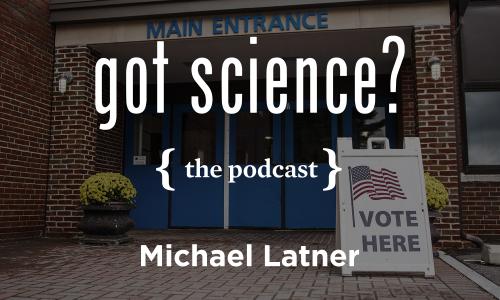Too often, companies use the Disinformation Playbook to make public policy work for them, instead of for all of us. And the Trump administration and the current Congress have been all too eager to play along, repeatedly sidelining science for the benefit of powerful interests.
But it doesn’t have to be that way. The Playbook is not unstoppable. And the best defense, as the saying goes, is a good offense.
It’s time for us to push back—exposing counterfeit science and manufactured uncertainty, defending targeted scientists, and spotlighting undue corporate influence on government policy, processes, and officials, as well as conflicts of interest in industry-university relationships.
Here are some things you can do to help stop the Disinformation Playbook and keep federal science strong, independent, and focused on serving the public interest.
What you can do
All of us
- Help track and resist attacks on science as they happen by signing up to become a UCS Science Champion. We’ll help you bring the conversation to your area by engaging with local media, at public events, and with influential communities to demystify the very real risks and consequences to the lives of your neighbors and your community when science is sidelined.
- Share the Playbook with your social media networks, and when you see a new example of a company using a tactic from the playbook to sideline science, call it out! The more people are aware of these tactics, the harder it will be for companies to get away with them.
- Push back against regulatory “reform” legislation like the Regulatory Accountability Act, which would make science-based policymaking more burdensome for federal agencies by allowing industry lobbyists to question strong science being used by agencies and delay important safeguards. Start now by joining the fight against attacks on car fuel efficiency standards.
- Set the record straight. If you find someone spreading disinformation on a topic, counter it. If the disinformation appears in the media, correct it in a comment or letter to the editor. Check the credentials and affiliations of experts you come across in the media—and follow the money. The Center for Responsive Politics’ Opensecrets.org is a great resource to find lobbying and political contribution information for companies and PACs.
- Consider divesting your retirement funds and other investments and making conscious consumer choices to avoid supporting companies that advance disinformation campaigns.
Scientists
- Become a UCS Science Network Watchdog to help track and resist attacks on science. The Scientist Watchdog Toolkit has helpful tools and trainings on how to collaborate with communities affected by disinformation campaigns and build relationships with your local legislators to serve as a resource and constituent voice.
- If you’re a federal scientist, report actions that diminish the role of science in policymaking at all levels. Federal agencies have the tools to help scientists report these instances through their scientific integrity policies and inspector general offices. UCS has resources to help scientists securely share information.
- Federal scientists can also share knowledge of situations in which the role of science in policymaking is being diminished under attorney-client privilege through the UCS Science Protection Project.
- Use your research and scientific expertise to advance the use of independent science in government by nominating yourself or a colleague to serve on a scientific advisory committee.
More recommendations
Companies
Company policies should state clearly that:
- Company employees must refrain from and reject acts of scientific misconduct such as fabrication of results, falsification of data, and plagiarism in proposing, conducting, and reviewing scientific analysis.
- Scientists employed at companies should disclose real and perceived conflicts of interest when publishing or presenting their scientific research in an accessible form.
- The company will not withhold negative results about the efficacy or safety of their products and activities.
- The company will publicly disclose all payments to politically active trade associations.
- When requested, the company will provide data and methodology to federal agencies (with appropriate confidentiality protections) to determine the safety and efficacy of products, byproducts, and practices.
- The company will not limit access to research materials that would allow independent scientists to verify the safety and efficacy of products, byproducts, and practices.
Companies should practice good corporate citizenship by:
- Encouraging employees, contractors, and trade associations to disclose conflicts of interest when providing testimony or comments for official government rulemakings, or when speaking or opining publicly.
- Breaking from trade associations or industry-affiliated groups that promote disinformation, or using their leverage to end disinformation produced by the group and speaking publicly about these efforts.
- Following the lead of B Corporations, pledging to “do no harm and benefit all” and committing to higher standards of transparency and accountability.
Federal Officials
Congress:
- Develop ways to limit access to and influence over decisionmakers through financial contributions.
- Maintain a commitment to protecting whistle-blowers and preventing retaliation for allegations related to agency scientific integrity policies, especially as they relate to interference with or manipulation of federal science for private gain.
- Investigate allegations of compromised scientific integrity, conflicts of interest, and other violations of ethics rules in the federal agency decisionmaking process, and make the results of this investigation readily available to the American people.
- Close loopholes in the Federal Advisory Committee Act. The legislation should extend the act’s rules to cover advisory committees organized by federal contractors, not just committees convened directly by an agency. Committee members, including nonvoting members who regularly attend meetings, should be asked to provide complete information on affiliations and conflicts of interest.
- Require that all individuals providing testimony before Congress disclose financial conflicts of interest , including non-government funding, in their public testimony.
- Reject the Financial Choice Act and similar legislative proposals that undermine the ability of investors to engage with public companies on social, environmental, and governance issues.
- Oppose any legislative attempts (like the Regulatory Accountability Act and the HONEST Act) to dismantle the science-based system for shaping and upholding public protections by creating more opportunity for industry lobbyists to obstruct or unduly influence the rule-making process.
- Direct the National Academy of Sciences to explore appropriate responses for scientists and institutions facing harassment or intrusive open records requests that interfere with their ability to pursue research.
- Leverage technology and innovation to make federal processes for gathering public input more inclusive and participatory so that disproportionately impacted communities, such as low-income communities and communities of color, can contribute meaningfully and sufficiently.
Executive branch:
- Agency heads should review, implement, and, as needed, improve existing scientific integrity policies to ensure that they include the following key provisions:
- A clear and detailed policy and procedure for addressing allegations of scientific integrity violations and publicly reporting their resolution.
- A declaration that employees who leave federal service should not be required to sign nondisclosure agreements restricting disclosure of government information that is neither classified nor proprietary nor contains confidential personal matters.
- Agency heads should ensure that ethics pledges for their employees are followed and that political appointees recuse themselves from decisions for which there is a perceived or direct conflict.
- Agencies such as the EPA and OSHA should create a publicly available federal registry, similar to the FDA’s clinical trials registry, for scientific research submitted to the agency to support policy decisions.
- Agencies should require that all scientific information or critiques, including post-market research on regulated products, include a brief conflict of interest disclosure.
- Agencies should request full conflict of interest disclosures from all who make comments on federal rulemakings.
- The Office of Government Ethics should be given more power to enforce ethics standards, including more oversight of agency ethics activities and the power to work with agency inspector generals to investigate potential undisclosed conflicts of interest or violations of conflict of interest waivers in government.
- The Office of Management and Budget, in consultation with the Attorney General and the Office of Science and Technology Policy, should ensure the operation of a consolidated online request portal (in accordance with the FOIA Improvement Act of 2016). Commercial entities requesting FOIA exemptions should be required to explain why scientific information they ask to be withheld qualifies as trade secrets or privileged commercial information in order to shift this burden of proof from the federal government to the commercial entity.
- The president should maintain a commitment to protecting whistle-blowers and direct his cabinet members to prevent retaliation against employees blowing the whistle regarding interference in science and abuses of agency scientific integrity policies.
- The Executive Branch should expand opportunities to increase public input into decision-making.
Academic Institutions
- Require that all staff researchers submit annual financial disclosure forms, and make these forms publicly available and easily accessible.
- Institute corporate ethics pledges, providing guidelines to foster ethical partnerships with corporate funders and partners. All contracts with corporate sponsors should be reviewed by the university’s general counsel and held to these pledges.
- Refrain from agreeing to gifts that give donors control over curriculum, academic work, hiring and firing of personnel, or other decisions that could have a real or perceived influence on academic freedom.
- Create research integrity standards and refrain from allowing corporate recruiters on campus if they violate those standards.
- Consider setting aside funding for legal protection of researchers who are attacked by those who don’t like their research focus, questions, or findings.
Scientific Journals and Organizations
- Peer-reviewed journals should require disclosure of all funder involvement in scientific studies, including from corporations, consulting firms, foundations, or other nongovernmental organizations, denoting whether the contract gave scientists the right to publish their findings without influence and without obtaining approval from the funder. These disclosures should be made available to the public for free.
- Scientific societies should disclose corporate sponsorship and pledge not to accept funds with strings attached related to their scientific work, or from companies that are actively participating in disinformation campaigns.
Media
- Avoid false equivalencies that distort scientific consensus on issues.
- Correct the record when scientific information is misrepresented.
- Report abuses of science in government and hold government officials accountable for actions that interfere with scientific integrity.
- Search for and report conflicts of interest from sources and those they quote.





